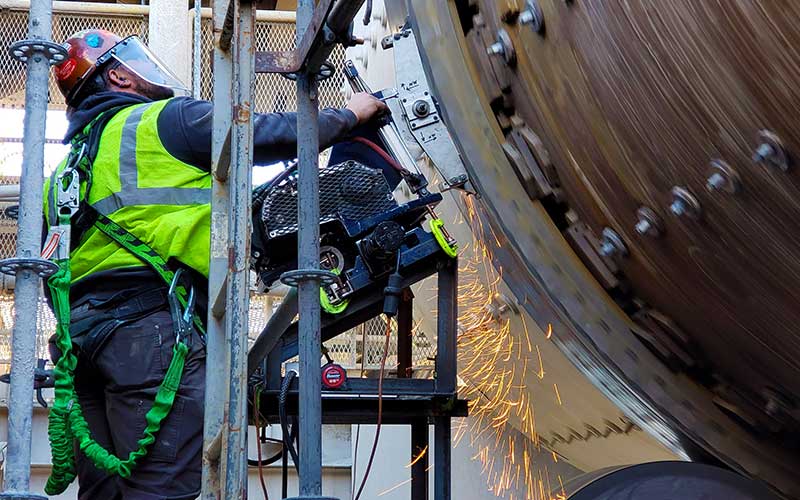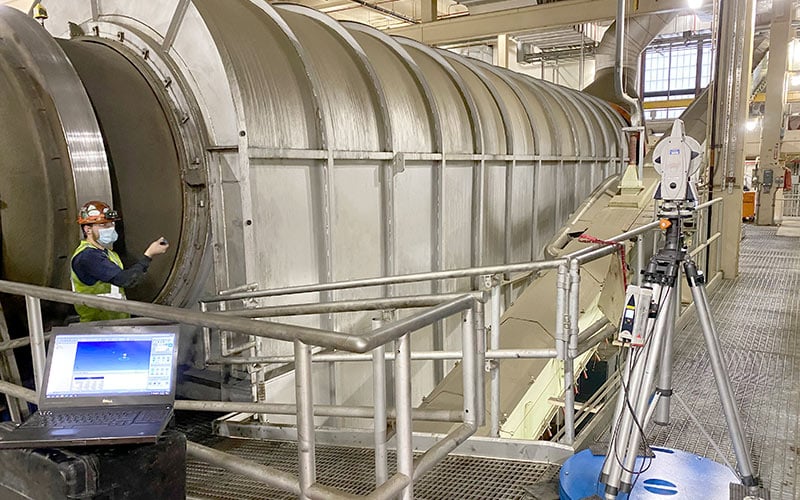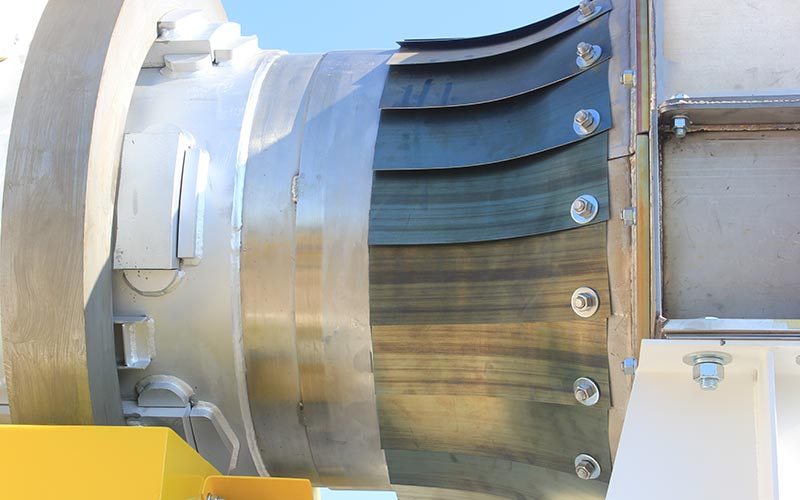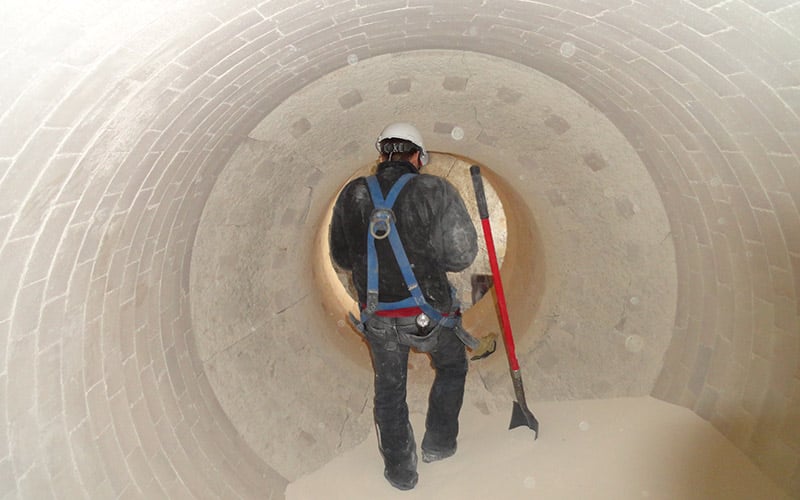In the face of growing demand, catalyst manufacturers are increasingly looking to rotary kiln maintenance programs to avert the escalating costs associated with downtime.
Rotary Kiln Maintenance in the Catalyst Market
When properly engineered and manufactured, rotary kilns are a reliable processing device, but they do require regular maintenance to continue performing as designed. The importance of proper rotary kiln maintenance becomes especially crucial in the catalyst industry, where demanding conditions have become the norm.
Additionally, changes in production such as increased capacity or additive inclusion are also likely to require adjustment in order to optimize performance. All of this translates into high demand for two types of rotary kiln maintenance: mechanical maintenance and process optimization.
Mechanical Rotary Kiln Maintenance
While the frequency of maintenance may vary according to the unique conditions of each catalyst manufacturer’s process, mechanical maintenance procedures are fairly universal for rotary kilns. Typical rotary kiln maintenance involves:
Tire and Trunnion Replacement and Repair
As the primary points of contact supporting the rotary kiln, tires and trunnions are a common wear point, particularly in high-production settings. Wear on tires and trunnions quickly escalates to more severe problems, necessitating a rapid response to any indication of an issue.
This may require replacement of tires or trunnions, or, in cases of minimal-to-moderate wear, tire and trunnion grinding, a resurfacing technique that grinds away the damaged surface to reveal the undamaged surface beneath.

A FEECO Customer Service Engineer performs grinding on a tire
Alignment
Proper kiln alignment is also essential to a preventative maintenance program. Kilns naturally fall out of alignment over time, requiring routine realignment to re-balance the unit and prevent premature wear. Like tire and trunnion wear, alignment touches all components of the kiln and has the potential to cause severe damage and even catastrophic failure if left untreated.
Kilns constantly operating under high-capacity loads, such as those in the catalyst sector, are likely to fall out of alignment faster than those in a less demanding production environment. Depending on the unique operational setting, realignment of catalyst kilns may need to be conducted every 12 to 18 months.
Alignment will also be required after any significant work is carried out on the unit, such as tire or trunnion repair or replacement, refractory replacement, or other major repairs, as these cause the kiln to become misaligned.

A laser alignment in progress
Drum Repair
Depending on the severity of the damage, drum shells exhibiting wear such as cracks or holes can be repaired with patches or welding as an alternative to replacement.
Furnace Repair
Similarly, failure in the refractory or insulation of the furnace may require patching or refractory replacement.
Seal Replacement
Because they help to maintain the internal processing environment, breeching seals have a significant impact on the overall efficiency of the kiln system. A seal in proper working condition reduces air leakage and maintains the controlled processing atmosphere required inside the kiln.
As such, a drop in efficiency, a rise in energy costs, or inadequate product discharging from the kiln may indicate that a seal is worn and should be replaced.
Various seal configurations exist, with the type chosen depending on the level of allowable leakage the system can tolerate.

Gear Replacement
When the gear and pinion drive assembly is utilized, proper gear mesh and lubrication is critical to the integrity of the gear. A worn girth gear can cause of number of issues and should be replaced as soon as possible to prevent further damage.
Process Optimization
Because rotary kilns are designed around the material characteristics and production conditions of the specific application, a change in production parameters or feedstock almost always requires adjustment to achieve optimal performance.
Additionally, as the process accrues normal wear and tear, conditions can change that may cause the process to under perform, not meet emissions requirements, or decrease in online availability.
A process audit may be required in the event that the kiln is not performing at capacity, has reduced efficiency, or is producing lower quality product than expected.
Combustion Chamber Tuning
Properly tuning the combustion chamber by resetting the burners and potentially adjusting combustion controls is a significant contributor to the overall efficiency of the rotary kiln.
Inspections & Audits
FEECO generally recommends all rotary drums undergo an annual inspection to assess the overall condition of the unit and address any issues before they have a chance to escalate.
The high temperatures, high-value product, demanding conditions, and costly expense of downtime found in the catalyst industry make routine inspections even more critical.
Regularly evaluating kiln mechanical condition and process efficiency through process and equipment audits circumvents extensive downtime and product loss due to unexpected repairs by catching potential issues at their onset.
A process audits focuses on the overall performance of the system and its surrounding components, while an equipment audit evaluates the mechanical status of the kiln.

A FEECO Customer Service Engineer inspects the interior of a refractory-lined rotary kiln
Conclusion
Catalyst manufacturers are scrambling to keep up with the expanding industry and rising production goals. As the cost of downtime rises, manufacturers are increasingly looking to avoid downtime through preventative rotary kiln maintenance.
Performing regular rotary kiln maintenance procedures such as those listed above, go a long way in avoiding costly downtime and lost production. Catalyst manufacturers employing rotary kilns should put a comprehensive preventative maintenance program in place involving routine inspections and process and equipment audits to identify potential problems early, keeping downtime and lost production to a minimum.
FEECO offers extensive rotary kiln support through annual inspections, audits, routine maintenance procedures, and more. With over 70 years of experience, our thermal processing experts and customer service engineers can assess and resolve any issues before they have a chance to become more severe, keeping your catalyst operation running reliably and efficiently. For more information, contact us today!



